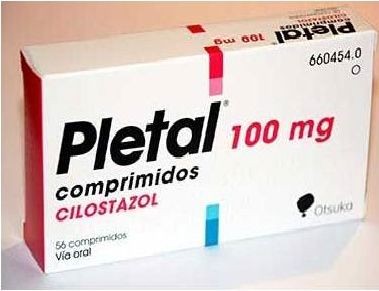
WARNING: Medications similar to cilostazol have shortened the lives of people with congestive heart failure. Do not use cilostazol if you have congestive heart failure.
USES: Cilostazol improves symptoms of intermittent claudication, a blood flow problem in the legs. It decreases muscle pain/cramps during exercise/walking by increasing blood flow and oxygen to the muscles. Cilostazol is an "anti-platelet" and vasodilator that prevents blood cells from sticking together and widens blood vessels in the legs.
HOW TO USE: Take cilostazol orally as directed by your doctor, usually twice daily without food. Dosage is based on your medical condition, response to treatment, and other medications you may be taking. Use this medication regularly to get the most benefit. Your symptoms may improve in 2-4 weeks, but it may take up to 12 weeks to notice a benefit. Contact your doctor if your condition persists or worsens.
SIDE EFFECTS: Common side effects include headache, diarrhea, runny nose, and dizziness. Serious side effects include fast/pounding/irregular heartbeat, swelling of the hands/feet, easy bruising/bleeding, black or bloody stools, vomit that looks like coffee grounds, signs of infection, chest/jaw/left arm pain, fainting, vision changes, weakness on one side of the body, slurred speech, confusion, and severe allergic reactions. This is not a complete list of side effects. Consult your doctor or pharmacist for more information.
PRECAUTIONS: Before taking cilostazol, inform your doctor or pharmacist if you are allergic to it or if you have bleeding disorders, congestive heart failure, other heart disease, stroke, kidney/liver disease, or blood disorders. Avoid activities that require alertness until you know how this medication affects you. Inform your doctor or dentist about all the products you use. Older adults may be more sensitive to side effects. Consult your doctor before using this medication during pregnancy or breastfeeding.
DRUG INTERACTIONS: Cilostazol may interact with blood thinners, other anti-platelet drugs, and certain medications that affect the removal of cilostazol from the body. Check all prescription and nonprescription medicine labels since many contain pain relievers/fever reducers that can increase the risk of bleeding/anti-platelet effect when used with cilostazol. Consult your doctor or pharmacist for more details.
OVERDOSE: If overdose is suspected, contact a poison control center or emergency room immediately.
NOTES: Do not share this medication with others. Monitor your progress and check for side effects with regular laboratory and/or medical tests. Discuss an exercise program with your doctor to improve walking and decrease pain.
MISSED DOSE: If you miss a dose, use it as soon as you remember. If it is near the time of the next dose, skip the missed dose and resume your usual dosing schedule. Do not double the dose.
STORAGE: Store at room temperature away from light and moisture. Keep all medications away from children and pets. Do not flush medications down the toilet or pour them into a drain unless instructed to do so. Properly discard this product when it is expired or no longer needed. Consult your pharmacist or local waste disposal company for more details.
Report Problems to the Food and Drug Administration
To report negative side effects of prescription drugs, visit the FDA MedWatch website or call 1-800-FDA-1088.
Selected from data included with permission and copyrighted by First Databank, Inc. This material has been downloaded from a licensed data provider and is not for distribution, except as may be authorized by the applicable terms of use.
CONDITIONS OF USE: The information in this database is intended to supplement the expertise and judgment of healthcare professionals. It is not intended to cover all possible uses, directions, precautions, drug interactions, or adverse effects. A healthcare professional should be consulted before taking any drug, changing any diet, or commencing or discontinuing any course of treatment.


